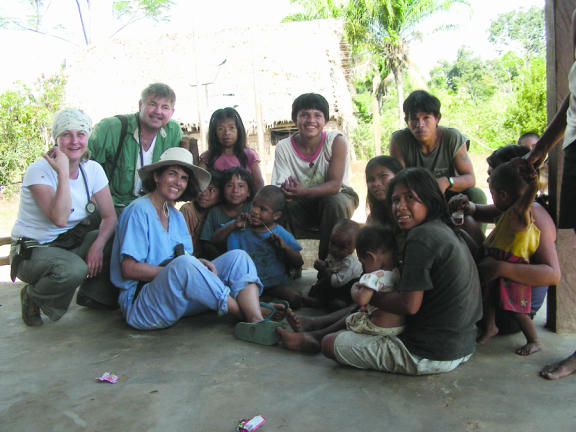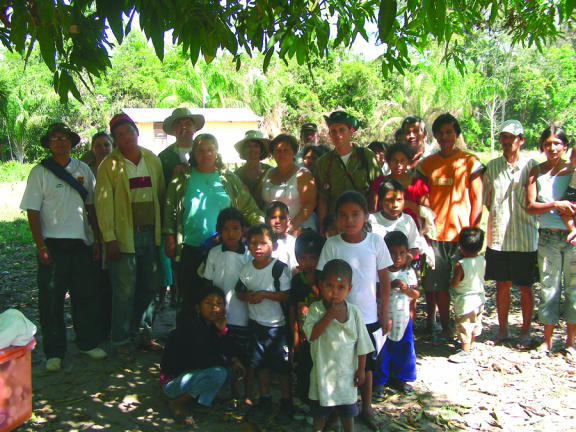I recently had the good fortune to take part in an elective in international health in Bolivia, organized through the newly developed International Resident Exchange Program (IREP) in the Department of Family Medicine at the University of Ottawa in Ontario. The trip was sponsored by the provincial government of Pando, the province we visited.
This elective consisted of 2 weeks of preparatory training in Ottawa, followed by 2 weeks of clinical work in Bolivia. The preparatory training included studying a streamlined curriculum of essential topics in international health and participating in a variety of clinics (eg, infectious disease, immigrant and refugee health, musculoskeletal). We also spent several months before the elective brushing up on our Spanish skills.
Our group consisted of 3 residents and our clinical supervisor, Dr Charles Czarnowski, an Assistant Professor in family medicine in Ottawa, who has extensive experience in international health, as well as 6 Bolivian team members, consisting of translators, a physician, and a dentist.
Our time in Bolivia was spent visiting small villages populated by different indigenous tribes in the province of Pando, the most rural and wild of all the provinces in the country. To reach these villages, which were quite isolated, it was necessary to travel by boat because roads were either inaccessible or unreliable. As we traveled deeper and deeper into the jungle down a river filled with crocodiles, piranhas, and anacondas, we provided much-needed medical service to various groups of people. In the end, we saw approximately 1200 patients during our 2-week stay in Bolivia and encountered an astounding number of fascinating medical cases, such as leishmaniasis, malaria, parasite infections, and Chagas disease, just to name a few. This exposure alone made the trip worthwhile.
The trip was not only about medical education, but also about adventure and experiencing a new culture. We swung from jungle vines, slept in rat-infested “hotels,” relaxed in hammocks in the middle of the jungle, and suffered the consequences of eating local food to which our stomachs were unaccustomed. Thank God for ciprofloxacin, dimenhydrinate, and antidiarrhetics!
Village life
Taking up residence in these small villages while doing our work there gave us a real taste of what the life and culture in rural Bolivia were really like. Although I am not a seasoned world traveler, the poverty that these people faced was unlike any I had ever seen before. Despite their poverty, however, the people welcomed us with such tireless hospitality and generosity that I often felt they were treating us as they would kings or queens.
The warm-heartedness of the people in the places we visited was in no way a reflection of their quality of life. I was truly shocked at how even the most basic health measures were missing from the villages we visited. Few of these villages had a clean water source or any attempt at sanitation, never mind even the most basic of medical supplies or equipment. A physician might visit these villages every few months or so at the most. If anyone developed a serious illness when a physician was not available, the patient would either recover naturally or die.
Case 1
One 25-year-old man was brought to our makeshift clinic suffering from severe hypovolemic shock as a consequence of a nasty vomiting illness he had contracted. By the time he was brought to us, he was missing both a pulse and a measurable blood pressure. Lacking intravenous fluids and the means to get him to a medical outpost in a timely manner, we were required to treat him with what we had at hand—oral antibiotics, antiemetics, and rehydration solutions. We diligently treated him for 24 hours, and he finally managed to turn around. This man’s dehydration, which would have been treated with relative ease in Canada, would have resulted in death if we had not happened to be there and had not been blessed with some good fortune in his response to treatment.
Case 2
Another man complained of having had a swollen scrotum (about the size of a large grapefruit when we saw him) for 2 years. Because hydrocele is seen with certain parasite infections, which are obviously quite common in the tropics, we began to drain the man’s scrotum, expecting to pat ourselves on the back for a job well done once we got the fluid off. Unfortunately, it turned out the man’s scrotal swelling was mainly a consequence of underlying testicular cancer that we discovered once we were able to palpate his testicles upon the removal of a minimal amount of fluid. Should this man have been seen sooner by a physician? Yes. However, it would cost the man several months’ wages just to be assessed by a physician in Bolivia. Only health care for children is covered by the government in Bolivia, and, even then, access to a physician in the remote areas is virtually impossible for most people, including this gentleman. The only thing we could do for him was to pray for a swift and painless death when his time finally comes.
Common problems
The most common cases by far were children with parasite infections. Unlike the 2 case studies, we were well supplied and equipped to deal with these patients. Diagnosis was often not a problem, as we could usually hear the rustling of hungry parasites from within the abdomen during simple auscultation. Treatment was simply a matter of giving the appropriate antiparasite medication, with which we were well supplied, but to which these people normally had no access.
The treatment we administered was only a temporizing measure for these people, because they would head home right after finishing with us and drink from the same contaminated water source and eat the same contaminated food from which they likely had contracted the parasites in the first place. It was a pleasure to offer these patients some short-term relief, but a long-term solution for this rampant problem cannot be provided solely from medicine. It can be solved only when Bolivians have access to basic sanitation and a reliable, clean water source. One might think that communities themselves would seek access to such basic health measures; however, the awareness that dirty water and poor sanitation is the source of so many ills just doesn’t exist in these communities. The people there do not know that their lives could be made much better with just a few simple changes, such as boiling water before drinking it. It will be only through ongoing education that things can be improved for these people over the long term.
International health initiatives
During this elective, I have really come to realize the importance of sustained international health programs. That is why I am very pleased that the Department of Family Medicine at the University of Ottawa seeks to implement well-designed international health initiatives in countries that need both short-term (eg, medical relief) and long-term (eg, ongoing efforts to improve infrastructure and implement public education programs) strategies to improve health and quality of life.
In Canada, I am so fortunate to live in a society that enjoys such an excellent quality of life—so excellent, in fact, that I often take for granted the simple things, such as clean food and water that are at the root of it all. Through my experiences in Bolivia, I have a greater appreciation of how important the simple things really are. My time in Bolivia has truly been a unique, wonderful, and enriching experience. I would highly recommend that any resident or physician, at least once, take the time to get involved in an international health effort. It’s an opportunity that provides not only a first-rate cultural and educational experience, but also a reminder of the important simple things that we Canadians often take for granted.


Our team pictured with villagers in Peninsula, Bolivia


